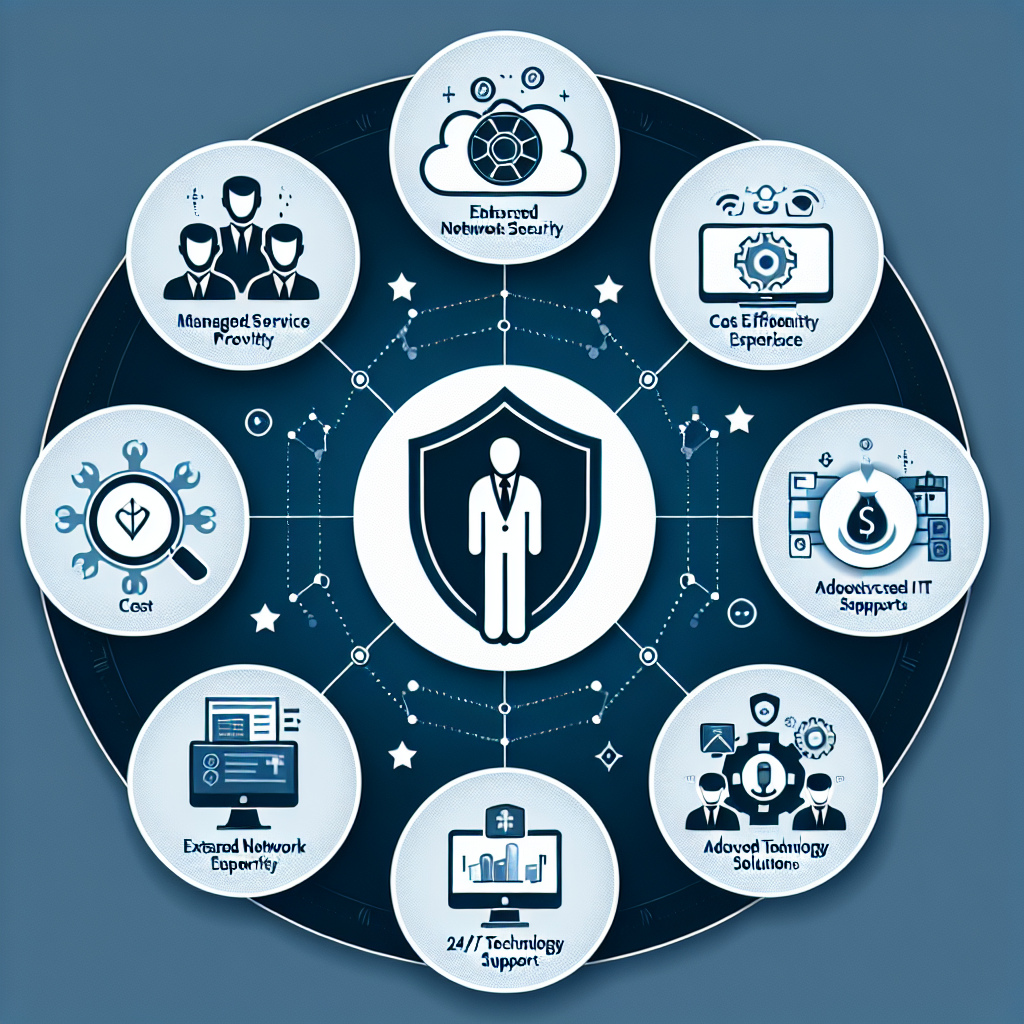Your cart is currently empty!
Tag: Managed

Cybersecurity and MSPs: How Managed Service Providers Can Protect Your Business from Cyber Threats
Cybersecurity is a growing concern for businesses of all sizes, as cyber threats continue to evolve and become more sophisticated. Managed Service Providers (MSPs) play a crucial role in helping businesses protect themselves from these threats and ensure the security of their valuable data.MSPs are third-party companies that offer a range of IT services, including cybersecurity solutions, to businesses. They have the expertise and resources to implement strategies and technologies that can defend against cyber threats and keep businesses safe from attacks.
One of the key ways that MSPs can protect businesses from cyber threats is by implementing robust security measures, such as firewalls, antivirus software, and intrusion detection systems. These tools can help to detect and prevent malicious activity on a company’s network, keeping sensitive data safe from hackers and cybercriminals.
MSPs also provide ongoing monitoring and management of a company’s IT infrastructure, ensuring that any potential security vulnerabilities are identified and addressed promptly. This proactive approach to cybersecurity can help to prevent data breaches and other security incidents that could have a significant impact on a business’s operations and reputation.
In addition to implementing security measures, MSPs can also provide training and education for employees on best practices for cybersecurity. Human error is a common cause of security breaches, so educating staff on how to recognize and respond to potential threats can help to minimize the risk of a cyber attack.
Furthermore, MSPs can help businesses to develop and implement a comprehensive cybersecurity strategy that aligns with their specific needs and requirements. This strategy may include regular security audits, risk assessments, and incident response planning to ensure that the business is prepared to respond effectively to any security incidents that may occur.
Overall, MSPs play a vital role in helping businesses protect themselves from cyber threats and ensure the security of their data. By partnering with an MSP, businesses can gain access to the expertise and resources needed to implement effective cybersecurity measures and defend against the ever-evolving threat landscape. With the right support in place, businesses can rest assured that their valuable data is safe and secure from cyber attacks.

Tips for Evaluating and Selecting the Best Managed Service Provider for Your Needs
In today’s fast-paced business world, many companies are turning to managed service providers (MSPs) to help manage their IT infrastructure and support their technology needs. With so many MSPs to choose from, it can be overwhelming to know which one is the best fit for your organization. Here are some tips for evaluating and selecting the best MSP for your needs.1. Define your needs: Before you start looking for an MSP, it’s important to clearly define your organization’s IT needs and goals. Consider what services you need, such as cloud hosting, cybersecurity, helpdesk support, or network monitoring. Understanding your needs will help you narrow down your options and find an MSP that can meet your specific requirements.
2. Look for experience and expertise: When evaluating MSPs, be sure to consider their experience and expertise in managing IT infrastructure. Look for providers with a proven track record of success and a team of certified professionals who are knowledgeable in the latest technologies and best practices.
3. Consider scalability: As your business grows, your IT needs will evolve. When selecting an MSP, it’s important to choose a provider that can scale with your business. Look for an MSP that offers flexible solutions and can easily adapt to your changing requirements.
4. Evaluate security measures: Cybersecurity is a top priority for businesses of all sizes. When selecting an MSP, be sure to inquire about their security measures and protocols. Look for providers that have robust security practices in place to protect your data and systems from cyber threats.
5. Check for compliance certifications: Depending on your industry, you may be required to comply with specific regulations and standards, such as HIPAA or GDPR. When selecting an MSP, be sure to check for compliance certifications that demonstrate their commitment to data security and privacy.
6. Review service level agreements (SLAs): SLAs outline the level of service that an MSP will provide and the metrics by which their performance will be measured. Be sure to review the SLAs of potential MSPs to ensure they align with your expectations and requirements.
7. Seek references and reviews: Before making a decision, be sure to seek references and reviews from current or past clients of the MSP. This will give you valuable insight into the provider’s reputation, customer service, and overall performance.
8. Consider cost and value: While cost is an important factor to consider, it’s also important to evaluate the value that an MSP can provide to your organization. Look for providers that offer competitive pricing and a range of services that align with your needs and budget.
In conclusion, selecting the best managed service provider for your organization requires careful evaluation and consideration of your specific needs, goals, and requirements. By following these tips, you can find an MSP that can support your IT infrastructure and help your business thrive in today’s digital landscape.

The Cost-Saving Benefits of Outsourcing Managed Services
Outsourcing managed services has become a popular choice for businesses looking to cut costs and increase efficiency. By outsourcing certain tasks and responsibilities to a third-party provider, companies can focus on their core functions and leave the rest to experts in the field.One of the key benefits of outsourcing managed services is cost savings. Instead of hiring and training in-house staff to handle tasks such as IT support, customer service, or human resources, businesses can simply pay a flat fee to an outsourcing provider. This eliminates the need for expensive salaries, benefits, and training costs associated with hiring full-time employees.
Additionally, outsourcing managed services can help businesses save on infrastructure costs. Many outsourcing providers have state-of-the-art technology and equipment that businesses may not be able to afford on their own. By outsourcing tasks such as IT support, businesses can access the latest technology without having to invest in expensive hardware and software.
Outsourcing managed services also allows businesses to scale up or down quickly and easily. When business needs change, outsourcing providers can adjust their services accordingly, saving businesses the time and hassle of hiring or laying off employees.
Furthermore, outsourcing managed services can help businesses reduce risks. Outsourcing providers are experts in their field and have the knowledge and experience to handle tasks efficiently and effectively. This can help businesses avoid costly mistakes and ensure that tasks are completed accurately and on time.
Overall, outsourcing managed services can provide businesses with a cost-effective way to access expertise and resources that they may not have in-house. By outsourcing tasks to experts in the field, businesses can save time, money, and resources, allowing them to focus on their core functions and grow their business.

How Managed Service Providers Can Help Your Business Scale
Managed service providers (MSPs) are becoming increasingly popular among businesses of all sizes as they offer a wide range of benefits that can help organizations scale and grow. In a fast-paced and competitive business environment, having the right technology infrastructure and support is essential for success. MSPs can provide the expertise and resources necessary to ensure that your business remains agile, efficient, and secure.One of the key ways that MSPs can help your business scale is by providing proactive IT management and support. Instead of waiting for problems to arise and then trying to fix them, MSPs monitor your systems and networks 24/7 to identify and address issues before they become major problems. This proactive approach helps to minimize downtime and ensure that your business operations run smoothly.
MSPs also offer a wide range of services and solutions that can help your business adapt and grow in a rapidly changing business environment. From cloud computing and data storage to cybersecurity and disaster recovery, MSPs have the expertise and resources to help you leverage the latest technologies and best practices to drive innovation and growth.
Another way that MSPs can help your business scale is by providing cost-effective solutions that can help you reduce IT expenses and improve your bottom line. By outsourcing your IT management and support to an MSP, you can avoid the high costs associated with hiring and training in-house IT staff, as well as the costs of purchasing and maintaining hardware and software. This can free up valuable resources that can be reinvested in other areas of your business to support growth and expansion.
In addition, MSPs can help your business scale by providing access to a team of highly skilled and experienced IT professionals who can help you navigate complex IT challenges and make strategic decisions that will support your business goals. With their expertise and support, you can focus on running and growing your business, knowing that your IT infrastructure is in good hands.
Overall, managed service providers can play a crucial role in helping your business scale and grow by providing proactive IT management and support, cost-effective solutions, access to the latest technologies, and a team of skilled professionals to support your business needs. By partnering with an MSP, you can gain a competitive edge in today’s business environment and position your business for long-term success and growth.

Unlocking the Potential of Managed Services for Small Businesses
In today’s fast-paced business environment, small businesses are constantly looking for ways to streamline their operations and increase efficiency. One way they can achieve this is by leveraging managed services to handle their IT needs.Managed services involve outsourcing the management of certain business functions to a third-party provider. This can include services such as IT support, network security, cloud computing, and data backup. By outsourcing these tasks, small businesses can focus on their core activities and leave the technical aspects to experts.
One of the key benefits of managed services for small businesses is cost savings. Instead of hiring a full-time IT staff or investing in expensive hardware and software, businesses can pay a monthly fee for the services they need. This allows them to budget more effectively and avoid unexpected expenses.
Managed services also offer scalability, allowing businesses to easily adjust their services as their needs change. For example, if a business experiences rapid growth, they can easily add more services or upgrade their existing ones without having to invest in additional infrastructure.
Additionally, managed services provide small businesses with access to the latest technology and expertise. IT providers are constantly updating their systems and staying current with industry trends, ensuring that businesses have access to cutting-edge solutions without having to invest in expensive upgrades.
Another advantage of managed services is increased security. With cyber threats on the rise, it is crucial for businesses to have robust security measures in place to protect their data and systems. Managed service providers can offer advanced security solutions such as firewalls, antivirus software, and intrusion detection systems to keep businesses safe from cyber attacks.
Overall, unlocking the potential of managed services can greatly benefit small businesses by improving efficiency, reducing costs, and enhancing security. By outsourcing their IT needs to a trusted provider, businesses can focus on their core activities and achieve greater success in today’s competitive market.

Maximizing ROI with Managed Service Providers: A Guide for Small Businesses
In today’s fast-paced business world, small businesses are constantly looking for ways to maximize their return on investment (ROI). One way to do this is by utilizing managed service providers (MSPs) to handle various aspects of their IT infrastructure.MSPs are third-party companies that provide a range of IT services to businesses, including network monitoring, data backup and security, and software management. By outsourcing these tasks to an MSP, small businesses can free up time and resources to focus on core business activities, while also benefiting from the expertise and resources of a dedicated IT team.
But how can small businesses ensure they are getting the most out of their investment in an MSP? Here are some tips for maximizing ROI with managed service providers:
1. Define your goals: Before partnering with an MSP, it’s important to clearly define your business goals and objectives. This will help you determine which services you need from an MSP and how they can help you achieve your goals.
2. Evaluate your current IT infrastructure: Take stock of your current IT systems and processes to identify areas where an MSP could provide value. This could include improving network security, streamlining software updates, or enhancing data backup and recovery processes.
3. Choose the right MSP: When selecting an MSP, it’s important to do your research and choose a provider that aligns with your business needs and goals. Look for an MSP with experience working with small businesses in your industry, and make sure they offer the services you need at a price that fits your budget.
4. Communicate effectively: Building a strong relationship with your MSP is key to maximizing ROI. Keep lines of communication open, provide clear feedback on their services, and work together to address any issues that arise.
5. Monitor performance: Regularly monitor the performance of your MSP to ensure they are delivering on their promises. Keep track of key metrics such as network uptime, response times, and security incidents to gauge the effectiveness of their services.
6. Continuously improve: Work with your MSP to identify areas for improvement and implement changes to optimize your IT infrastructure. By continuously evaluating and refining your partnership with an MSP, you can ensure you are getting the most out of your investment.
Overall, partnering with an MSP can be a cost-effective way for small businesses to enhance their IT capabilities and maximize ROI. By following these tips, small businesses can build a successful partnership with an MSP that helps them achieve their business goals and drive growth.

Choosing the Right Managed Service Provider for Your Company: A Guide
In today’s fast-paced business environment, companies are increasingly turning to Managed Service Providers (MSPs) to handle their IT needs. MSPs offer a wide range of services, from network monitoring and security to data backup and disaster recovery. Choosing the right MSP for your company is crucial, as they will play a key role in ensuring the smooth operation of your business.Here are some key factors to consider when selecting an MSP for your company:
1. Experience and Expertise: Look for an MSP that has a proven track record in providing IT services to companies in your industry. They should have a team of experienced professionals who are experts in their field and are up-to-date on the latest technologies and trends. Check their references and ask for case studies to see how they have helped other businesses.
2. Services Offered: Consider what services your company needs and make sure the MSP offers them. Some common services provided by MSPs include network monitoring, security, data backup, and cloud services. Make sure the MSP can tailor their services to meet your specific needs and can scale as your business grows.
3. Security and Compliance: Data security is a top priority for businesses, especially in industries that handle sensitive information. Ensure the MSP has robust security measures in place to protect your data from cyber threats. They should also be compliant with industry regulations and standards, such as HIPAA for healthcare or GDPR for data protection.
4. Support and Response Times: It’s important to choose an MSP that offers 24/7 support and has a fast response time to address any IT issues that may arise. Make sure they have a dedicated support team that can quickly resolve problems and minimize downtime for your business.
5. Pricing and Contracts: Consider the cost of the MSP’s services and compare them with other providers in the market. Look for a provider that offers flexible pricing options and transparent contracts with no hidden fees. Make sure you understand what is included in the service agreement and what additional costs may apply.
6. Communication and Relationship: A successful partnership with an MSP is built on good communication and a strong relationship. Choose a provider that is responsive to your needs and keeps you informed about the status of your IT systems. They should act as a trusted advisor, offering recommendations for improving your IT infrastructure and helping you achieve your business goals.
In conclusion, choosing the right Managed Service Provider for your company is a critical decision that can have a significant impact on your business operations. By considering factors such as experience, services offered, security, support, pricing, and communication, you can find an MSP that meets your needs and helps your company thrive in today’s competitive business landscape.

The Benefits of Managed Services for Your Business
In today’s fast-paced and competitive business environment, companies are constantly looking for ways to stay ahead of the curve and maximize their efficiency. One strategy that many businesses are turning to is utilizing managed services. Managed services involve outsourcing certain IT functions to a third-party provider who takes on the responsibility of managing and maintaining those services.There are a multitude of benefits that come with utilizing managed services for your business. One of the most significant advantages is cost savings. By outsourcing IT functions to a managed services provider, companies can save money on hiring and training in-house IT staff, as well as on the costs associated with maintaining and upgrading technology infrastructure. Managed services providers often offer flexible pricing models that allow businesses to pay only for the services they need, reducing overall IT costs.
Another key benefit of managed services is increased efficiency. By entrusting IT functions to a team of experts, businesses can free up their internal staff to focus on core business activities. This allows companies to operate more smoothly and efficiently, leading to improved productivity and ultimately, increased profitability.
Managed services also offer businesses access to the latest technology and expertise. Managed services providers are constantly updating their technology and skills to stay ahead of the curve, ensuring that their clients have access to the best solutions available. This can be especially beneficial for small and medium-sized businesses that may not have the resources to invest in cutting-edge technology on their own.
In addition, managed services can help businesses improve their security and compliance. Managed services providers are well-versed in the latest cybersecurity threats and compliance regulations, and can help businesses implement robust security measures to protect their data and ensure compliance with industry standards.
Overall, the benefits of managed services for businesses are clear. From cost savings and increased efficiency to access to the latest technology and expertise, managed services can help companies of all sizes streamline their operations and stay competitive in today’s rapidly evolving business landscape. If you’re looking to take your business to the next level, consider partnering with a managed services provider to help you achieve your goals.

The Benefits of Managed Service Providers: How MSPs Can Improve Your Business’s Efficiency
In today’s fast-paced business world, efficiency is key to staying ahead of the competition. One way to achieve this efficiency is by partnering with a managed service provider (MSP). Managed service providers are third-party companies that take on the responsibility of managing a business’s IT infrastructure and services. By outsourcing these tasks to an MSP, businesses can focus on their core operations and leave the technical aspects to the experts. Here are some of the benefits of working with an MSP and how they can improve your business’s efficiency.1. Increased Focus on Core Business Activities
By entrusting the management of your IT infrastructure to an MSP, your team can focus on what they do best – running the business. This allows employees to concentrate on strategic initiatives and revenue-generating activities, rather than being bogged down by technical issues and maintenance tasks.
2. Access to Expertise and Specialized Skills
Managed service providers have a team of highly skilled professionals with expertise in various areas of IT. By working with an MSP, businesses can tap into this pool of talent and benefit from specialized skills that may not be available in-house. This ensures that your IT infrastructure is in good hands and operating at peak performance.
3. Proactive Monitoring and Maintenance
MSPs provide 24/7 monitoring and maintenance of your IT systems to prevent potential issues before they occur. This proactive approach helps to minimize downtime, improve system reliability, and ensure that your business operations run smoothly at all times. With regular updates and patches, MSPs can also enhance the security of your IT infrastructure and protect your sensitive data from cyber threats.
4. Scalability and Flexibility
As your business grows, your IT needs will evolve as well. Managed service providers offer scalable solutions that can be customized to meet your changing requirements. Whether you need to add new users, upgrade software, or expand your network, MSPs can adapt to these changes quickly and efficiently. This flexibility allows businesses to stay agile and responsive to market demands without the hassle of managing IT infrastructure internally.
5. Cost-Effective Solutions
Outsourcing IT services to an MSP can result in cost savings for businesses. MSPs typically offer subscription-based pricing models that allow businesses to pay for only the services they need, without incurring additional overhead costs. By outsourcing IT management to an MSP, businesses can also avoid the expenses associated with hiring and training in-house IT staff, as well as the costs of purchasing and maintaining hardware and software.
In conclusion, managed service providers play a crucial role in improving a business’s efficiency by taking on the responsibility of managing its IT infrastructure. By partnering with an MSP, businesses can benefit from increased focus on core activities, access to specialized skills, proactive monitoring and maintenance, scalability and flexibility, and cost-effective solutions. In today’s competitive business landscape, working with an MSP can give your business the edge it needs to succeed.

The Top 5 Benefits of Using a Managed Service Provider for Your Business
In today’s fast-paced business environment, it is more important than ever for companies to stay ahead of the competition and maximize their efficiency. One way to achieve this is by utilizing the services of a managed service provider (MSP). An MSP is a third-party company that manages the IT infrastructure and services of a business, allowing the company to focus on its core operations.Here are the top 5 benefits of using a managed service provider for your business:
1. Cost savings: One of the biggest advantages of using an MSP is the potential for cost savings. By outsourcing IT services to a managed service provider, companies can eliminate the need to hire and train in-house IT staff, saving on payroll and benefits costs. Additionally, MSPs typically offer fixed monthly pricing plans, allowing businesses to budget their IT expenses more effectively.
2. Increased efficiency: Managed service providers are experts in managing IT infrastructure and services, which means they can quickly resolve any issues that arise and keep systems running smoothly. This can help minimize downtime and ensure that employees can focus on their work without being interrupted by technical problems.
3. Access to the latest technology: Keeping up with the latest technology can be a challenge for businesses, especially smaller companies with limited resources. Managed service providers have access to the latest tools and technologies, allowing them to provide cutting-edge solutions to their clients. This can help businesses stay competitive and adapt to changing market conditions.
4. Enhanced security: Cybersecurity is a major concern for businesses of all sizes, as data breaches can have devastating consequences. Managed service providers have the expertise and resources to implement robust security measures and protect sensitive company data from cyber threats. This can give businesses peace of mind knowing that their IT systems are secure and protected.
5. Scalability: As businesses grow and evolve, their IT needs may change. Managed service providers offer scalable solutions that can easily adapt to the changing needs of a business. Whether a company needs to add new users, upgrade software, or expand its infrastructure, an MSP can provide the necessary support and resources to accommodate these changes.
In conclusion, utilizing a managed service provider can offer numerous benefits for businesses, including cost savings, increased efficiency, access to the latest technology, enhanced security, and scalability. By outsourcing IT services to an MSP, companies can focus on their core operations and drive growth and success in today’s competitive business landscape.
